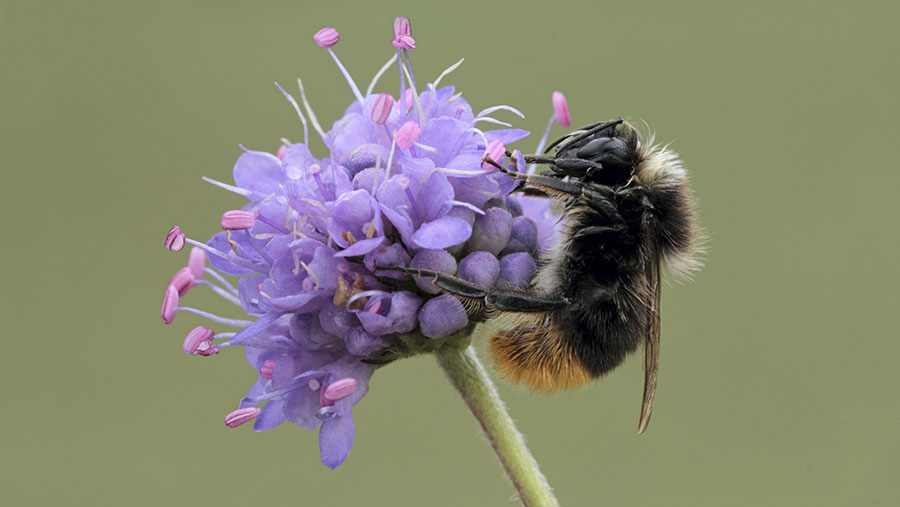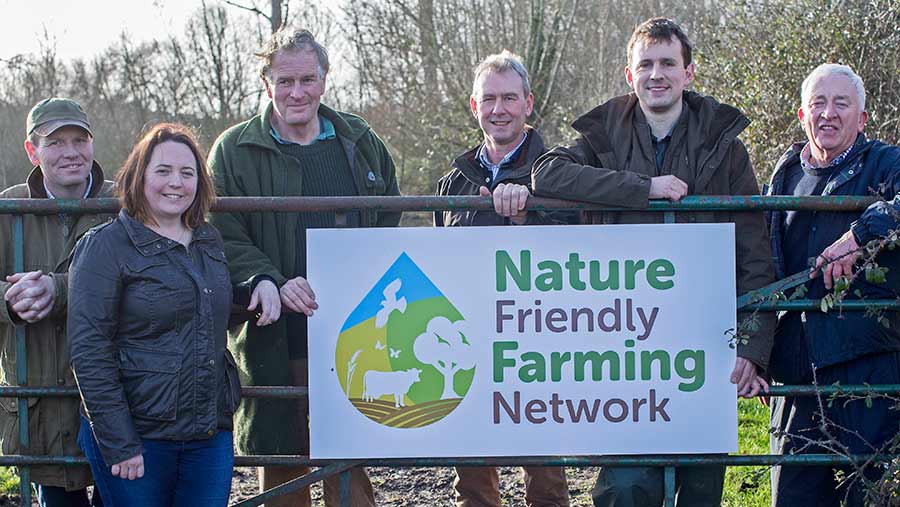Farmers’ network backs Gove’s ‘green’ Brexit plan
 © FLPA/Rex/Shutterstock
© FLPA/Rex/Shutterstock More than 100 farmers have come together to support calls for government policies that reward producers who undertake environmental measures and encourage wildlife.
The Nature Friendly Farming Network (NFFN) has endorsed the view of Defra secretary Michael Gove that post-Brexit farm support should move away from the current system of direct payments towards practices that enhance soil, landscapes and habitats.
See also: Basic payments to continue until 2024 – Gove
NFFN chairman and Cambridgeshire arable farmer Martin Lines said: “Brexit presents a once-in-a-generation opportunity to create a new farming policy that will help farms evolve and thrive – at the same time as restoring and protecting our natural heritage.
“We can use this opportunity to create a long-term, stable policy framework that will drive a mainstream shift towards a sustainable, productive, nature-friendly future for British farming as well as protecting the landscape across the UK.”

Martin Lines
Preferred approach
Mr Gove outlined his preferred approach to agricultural support after the UK leaves the European Union at last month’s Oxford Farming Conference. If he gets his way, it could see direct payments all but phased out over a five-year period following Brexit in March 2019.
Mr Gove said: “As we leave the EU, we have a historic opportunity to design a new system that works for our farmers – putting responsible land management at the heart of the industry and moving away from the inefficient and ineffective Common Agricultural Policy.”

Michael Gove © David Hartley/Rex/Shutterstock
More detailed proposals – including plans to base farm support on environmental measures – will be contained in a Defra consultation paper published in the coming weeks. It will be followed by a government agriculture bill later this year.
The NFFN believes the new framework should focus on encouraging growers and livestock producers to restore British wildlife, reverse declines in soil quality and help manage the effects of climate change – as well as producing affordable, healthy food.
Such an approach is too bold for some. The NFU, for example, has cautioned that an emphasis on environmental measures will only be sensible if the UK secures an adequate post-Brexit trade deal – and government policies on regulation and labour allow agriculture to flourish.
Need for change
Indeed, many farmers already use nature-friendly farming practices. But the NFFN argues that the “scale of the decline in wildlife and soil quality” and the challenges presented by climate change mean this work needs to be scaled up rapidly with strong policy support.
It aims to “provide a political voice for the thousands of farmers who are committed to managing their land for wildlife and public service, as well as growing and providing food” in the firm belief that doing so will be key to the long-term survival and success of British farming.
The group says it is independent – but it is backed by a range of environmental groups and charities. Supporters include the National Trust, the RSPB, the Woodland Trust, the Wildlife Trusts, Bumblebee Conservation Trust, Butterfly Conservation, Buglife and Plantlife.

Members of the Nature-Friendly Farming Network © David Hartley
National Trust head of farming Rob Macklin said: “Many of the things we need from the countryside – wildlife, healthy soils, clean water, flood protection and carbon storage – are ‘public goods’ that fall outside conventional markets.
“Post-Brexit, we need a policy and subsidy framework that rewards farmers for conserving natural resources alongside production. We want the government to offer farmers a joined-up package of support to benefit nature-friendly farming across the UK.”
Six-point framework for sustainable farming
1. Growing healthy, nutritious food.
2. Addressing degradation and improving the quality of soil.
3. Helping wildlife to recover and thrive.
4. Reducing greenhouse gases and managing effects of climate change, such as flooding.
5. Keeping our seas and rivers clean and reducing water-borne pollution.
6. Being custodians of the British landscape and enabling the public to enjoy and benefit from our natural heritage.
(Source: NFFN)

Neil Heseltine © Stephen Garnet
Case study: Neil Heseltine, North Yorkshire
Mr Heseltine rears cattle and sheep across 445ha at Hill Top Farm, Malham – an upland farm that is 80% above the moorland line.
Farming with his partner, Leigh, the couple have reduced overall stocking density from 800 Swaledale sheep 14 years ago to a breeding herd of 190 sheep and 30 Belted Galloway cattle. The farm now averages 120 cattle and 300 sheep, and it is managed with the environment in mind.
“There is currently a misconception that you have to be either a commercial farmer or a nature-friendly farmer. My belief is that to be a successful commercial farmer, you need to go down a nature-friendly route. It’s not just a binary choice, the two are inextricably linked.”
Reducing stocking density on the farm has seen a drop in output and less income from agriculture, says Mr Heseltine. But this fall has been more than offset by an even bigger drop in production costs – so overall profits are up.
Mr Heseltine now manages the land for wildlife and biodiversity. The environment has changed dramatically. Fields are cut later – not before mid-July – creating a habitat for ground nesting birds and encouraging more plants to flower.
Free advice for Countryside Stewardship applicants
The RSPB is offering free advice to farmers in East Anglia who would like to get paid to encourage wildlife on their land.
Applications are now open for the government’s newly expanded and simplified Countryside Stewardship scheme – including four new simplified options that make it easier for farmers to do their bit for the environment.
The streamlined packages are available to farmers willing to incorporate wildlife areas on at least 3% of their farmed land. Options include providing habitats for farmland birds that can also benefit other species – such as brown hare, water voles and pollinators.
All the new packages are non-competitive, meaning those who apply will be guaranteed an agreement as long as they meet scheme requirements. Applications for the new arable package can be completed and submitted online from 20 February.
RSPB conservation adviser Andrew Holland said: “The new arable offer and especially the online application makes it so easy for farmers to apply and we can help them to do this as well as provide ongoing support for managing habitats on the farm.”
